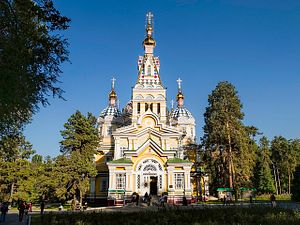A district court in Astana sentenced a 60-year-old Jehovah’s Witness to five years in jail on May 2. Teimur Akhmedov was convicted of violating Article 174 of the Kazakh criminal code, which concerns incitement of “ethnic, social, religious, family, and racial hatred.” According to RFE/RL, Akhmedov will appeal.
In January, Akhmedov and 43-year-old Asaf Guliyev were arrested in Astana by the National Security Committee (KNB). The state claimed that between May and October of the previous year, the two men held several meetings to discuss their faith. As Interfax described the case: “During such meetings, in the presence of their followers, the two men publicly spoke negatively about representatives of Islam, Catholicism, and Orthodoxy and said that one religion was superior to another.”
Among the attendees were KNB informants who secretly recorded the discussions.
The verdict was criticized by Forum 18, a Norwegian Christian nonprofit which focuses on religious freedom, and has been closely following the proceedings. Akhmedov’s lawyers claimed their defendant has cancer and should have been released from pretrial detention for treatment; they have also alleged that he was beaten in pretrial detention.
Forum 18 and Human Rights Without Frontiers (HRWF) say that the two Jehovah’s Witnesses were invited by several men claiming to be students to discuss their faith in a rented apartment. The implication is that the two men were set up, led into incriminating conversations in response to questions posed by the students, and recorded.
Guliyev was tried separately and confessed in February. He was given a sentence of five years’ restricted freedom. Akhmedov’s trial began in early April and he denied the charges, resulting in his jail sentence of five years, plus an additional three year ban on preaching.
Kazakhstan has been listed by the U.S. Commission on International Religious Freedom as a Tier 2 country since 2013. In 2016, given state anxiety over public unrest, restrictions on religious expression by non-traditional religious communities increased.
The most recent USCIRF’s review of religious freedom in Kazakhstan notes that a state program to counter religious extremism and terrorism currently under development advocates “for more state-supported alleged ‘anti-sect’ centers, which often criticize Protestants, Jehovah’s Witnesses, and Ahmadis and take part in their trials.”
There is a touch of hypocrisy in jailing a preacher for comments advocating the superiority of his own religion (which frankly seems a given — who would follow a faith believing it inferior to another?), while also supporting centers which criticize “non-traditional” religions. Kazakhstan’s 2011 law on religions holds all religions equal under the law but also “recognizes the historical role of Hanafi Islam and Orthodox Christianity.”
Though unrelated, the timing demands mention of the recent ruling by the Russian Supreme Court banning Jehovah’s Witnesses as an “extremist” group. A report from the Christian Science Monitor noted that some saw the ruling as “the hand of the powerful Russian Orthodox Church” but that others (and this is the bit with more relevance for the Kazakh context):
… suggest it’s part of a more general wave of “majoritarian” social conservatism that’s enforcing a gradual homogenization on the entire society. Civil rights experts worry the move could presage a wider crackdown on “non-traditional” religious faiths, generally viewed as alien to Russia, that took root around the country in the wake of the Soviet Union’s collapse a generation ago.
The same social and political factors that may be behind a wave of “majoritarian” social conservatism manifesting as pressure on “non-traditional” faiths in Russia also exist in Kazakhstan.

































